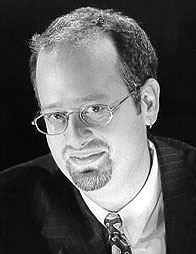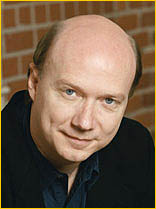
WRITERS GUILD HANDS OUT HONORS
by Susan Royal
You Can Count on Me won Best Original Screenplay and Traffic took Best Adapted Screenplay honors at the 53rd Annual Writers Guild Awards held simultaneously at the Beverly Hilton Hotel in Los Angeles and at the Plaza Hotel in New York.
Kenneth Lonergan had previously received many honors for You Can Count on Me since its debut at Sundance last year. In his acceptance speech he spoke of difficulty maintaining the integrity of oneâs script ãin the face of repeated and enthusiastic suggestions of everybody you meet.ä He added, ã I hate notes ö all notes ö good or bad. I never want to see another note again.ä This played well to the room full of writers, getting one of the bigger hands of the evening. He acknowledged his fellow writers who ãare hard at work writing several hours a day, or in my case, several tense minutes a day.ä
Lonergan had high praise for his actors, as did Stephen Gaghan in accepting the award for Traffic. Gaghan thanked actor Benicio del Toro in particular for his contribution to the script, with suggestions of how to avoid stereotypes in the Mexico story line.
In fact the Awards show underlined the special relationship between writer and actor, with much mutual admiration displayed. Many of the presenters were actors. They praised writers for creating their characters and dialogue and several writers expressed the thrill of seeing their words brought to life by actors.
The nominees for Best Original Screenplay were:
Almost Famous -- Cameron Crowe
Best in Show -- Christopher Guest, Eugene Levy
Billy Elliot -- Lee Hall
Erin Brockovich -- Susannah Grant
You Can Count on Me -- Kenneth Lonergan
The nominees for Best Adapted Screenplay were:
Chocolat -- Robert Nelson Jacobs
Crouching Tiger, Hidden Dragon -- James Schamus, Wang Hui-Ling, Tsai Kuo-Jung
High Fidelity -- D.V. DeVincentis, Steve Pink, John Cusack, Scott Rosenberg
Traffic -- Stephen Gaghan
Wonder Boys -- Steve Kloves
In addition to the best screenplay honors, a number of special awards were given.
 Doug Wright, winner of the Paul Selvin Award. |
|
The Paul Selvin Award goes to "that member or member whose script best embodies the spirit of the constitutional and civil rights and liberties, which are indispensable to the survival of free writers everywhere, and to whose defense Paul Selvin committed his professional life." (Paul Selvin served as counsel for the WGA for 25 years.)
This year's recipient was Doug Wright for his screenplay Quills, which he adapted from his play about the final days of the Marquis de Sade, imprisoned for over 30 years of his adult life for crimes ranging from rape to pornography. But it is the censorship of Sade's writing by a repressive government and church that is at the center of Quills.
Rather than write a biographical account of Sade's life, Wright was interested in addressing critical issues of artistic freedom. Says Wright, "Sade raises inevitable and necessary questions about the very nature of art. What is its true function in a culture? To uphold society's tenets or to challenge them? To reassure or to agitate? To buttress those institutions which shape civilizations -- the government, the church -- or to expose them? Does political oppression actually breed -- rather than stifle -- provocative art? What happens when we silence our extremists? What happens when we give them a voice?"
Wright won an Obie Award for outstanding achievement in playwriting and the Kesselring Award for best new American play for his play Quills. The screen adaptation is Wright's feature film debut. It was chosen as Best Picture of the Year by the National Board of Review and has been nominated for three Academy Awards.
The star of Quills, Geoffrey Rush, presented Wright with the award, thanking him for creating his character, which he described as "somewhere between King Lear and Norma Desmond." In accepting, Wright said, "The oppressor always winds up becoming the muse. Nothing is more inspiring to an artist than to tell him: Don't do that!"
The Valentine Davies Award
 Paul Haggis, winner of the Valentine Davies Award. |
|
Haggis, exec producer and co-creator of "Family Law," created the critically acclaimed "Due South" and "EZ Streets" and developed "Michael Hayes." He's written and produced for "thirtysomething," "L.A. Law," and "The Tracey Ullman Show." He has won two Emmys, a Golden Globe, a Viewers for Quality Television Award, six Gemini Awards and the Humanitas Prize.
Haggis' support of human rights includes holding events in his home for Amnesty International, El Rescate, The Center for Victims of Torture, Office of the Americas, The Citizens Commission on Human Rights and many others. He allowed students who escaped the massacre at Tienemen Square to organize their secret fax campaign from his home. And it was from his home that the Dalai Lama reached out to the Hollywood community about the atrocities in Tibet.
Haggis has also supported numerous environmental and community causes. He is an active member of the Entertainment Industries Council, is currently organizing on behalf of HELP (the Hollywood Education and Literacy Project) and For The Arts (an endowment to put arts back into public schools) and has established a scholarship fund for inner-city youth. Earlier this year, he received EMA's Environmental Media Award and the Ethel Levitt Memorial Award for Humanitarian Service.
The Paddy Chayefsky Laurel Award For Television
Kelsey Grammer presented comedy writer David Lloyd with this year's Chayesfsky award, given to writers "who have advanced the literature of television through the years, and who have made outstanding contributions to the profession of the television writer."
Llyod began his career writing for Jack Paar and Johnny Carson before going on to "The Mary Tyler Moore Show," "Taxi," "Bob Newhart," "Cheers" and "Frasier," among others.
Lloyd has been nominated for nine Emmys and won two for "The Mary Tyler Moore Show" -- the final episode and the classic "Chuckles Bites the Dust," which was screened at the Awards show. He's been nominated for seven Writers Guild Awards over the years.
The Screen Laurel Award
Betty Comden and Adolph Green, perhaps best known for their writing careers on Broadway, were honored with the WGA's highest screenwriting prize, the Screen Laurel Award for their nine musical screenplays, which include Singin' in the Rain and The Band Wagon.
The pair have collaborated for over 50 years. They have received two Academy Award nominations, three WGA nominations (winning twice) and in 1991 received the Kennedy Center Honors.
They delighted the awards show audience with a performance -- a couple of song parodies and jokes -- and delivered a line from Singin' in the Rain: "If we have brought a little joy into your hum-drum lives, well, it ain't been in vain for nothin'."
The Morgan Cox Award
Past WGAw president George Kirgo received the Morgan Cox Award, presented to "that member or group of members whose vital ideas, continuing efforts and personal sacrifice best exemplify the ideal of service to the Guild." It was presented to him by his niece, Tyne Daly.
George Kirgo, a screen and television writer since 1954, has been the vice president of the Writers Guild Foundation since 1995. Kirgo was a board member from 1985 to 1987, and became president of the WGAw in 1987, shortly before the 1988 strike. "As president of the Writers Guild of America, west from 1987 to 1991, George Kirgo led us through a difficult time--the 1988 strike," said John Wells. "Over the years, he has devoted himself tirelessly to the Guild and the interests of its members."
In a very funny acceptance speech, Kirgo thanked "all the little people I've trampled over the years and my parents -- watching, no doubt, from their celestial card table."
![]()
Inside Film Home | News & Views | Film Fests by Month
Screenwriting | Past Articles
All Inside Film logos, artwork, stories, information and photos are
© 1997-2020 Inside Film Magazine. All rights reserved.
Do not duplicate or distribute in any form. All other logos,
artwork and photos are © their individual owners.